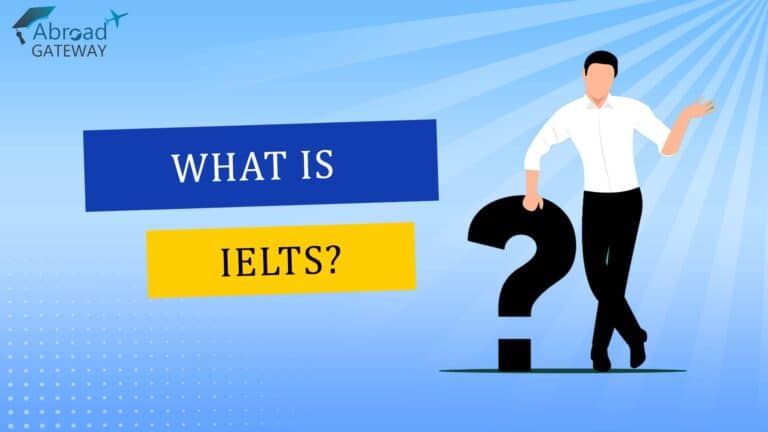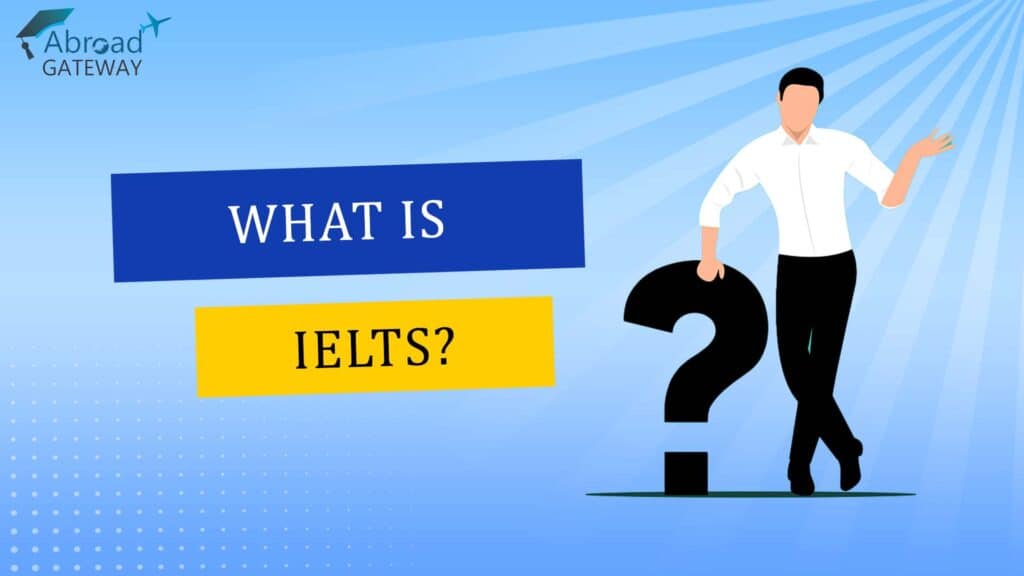What is IELTS?

Have you ever wondered why everyone needs to take the IELTS test before migrating to developed countries on student visa or for Permanent Residency? Here’s all the information you need to know about IELTS exam.
-
IELTS:
- International English Language Testing System.
-
Who owns it?
British Council, IDP IELTS Australia, and Cambridge Assessment English jointly own the IELTS.
-
Why take the IELTS test?
For getting student visa or to get permanent residency in developed nations.
-
How many times one can give this exam?
The IELTS exam is conducted 48 times a year, i.e., four times a month, and the IELTS test booking fee is around Rs. 14,700 as on March 2022.
-
Why they need the test?
To determine an individual’s proficiency in the English language for getting student visa or PR
-
Who accepts the test?
Over 11,000 organizations globally recognize IELTS exam, which means that it is the most popular of all the exams.
-
Marking criteria:
The IELTS academic and general training score ranges from 1 Band to 9 Band.
-
Result :
The result comes out after 13 days
The IELTS exam is designed to test the full range of one’s English skills, including listening, reading, writing, and speaking, by the world’s leading language assessment experts. The IELTS exam is of two types, i.e., IELTS Academic & IELTS General Training, and conducted in both Computer-based and Paper-based modes. So, let’s take a closer look at both types of IELTS Test.
Which IELTS is suitable for you?
IELTS Academic
Are you planning to get student visa in English-speaking countries? Then IELTS Academic test will be the right choice. IELTS Academic test assesses one’s proficiency in English to measure one’s readiness to study at an undergraduate level or a post-graduate level. This IELTS exam consists of Listening, Reading, Writing, and Speaking. Let’s dive deep into all the segments of IELTS exam.
IELTS Academic Listening:-
IELTS Listening Test assesses one’s listening ability, which involves understanding speakers’ main ideas, views, purpose, and attitude and how one is following the development of ideas.
IELTS Listening consists of four sections, each with one recording, which includes 40 questions:
- MCQ,
- Flowchart completion,
- Matching,
- Note completion,
- Labelling a diagram,
- Summary completion,
- Form completion,
- Table completion,
- Short answers.
The duration of Listening is 30 minutes and Listening is the same for both the IELTS Academic and IELTS General Training. Improving the listening is the key to improve IELTS academic listening score.
IELTS Academic Reading:-
The IELTS Academic Reading tests one’s ability to understand by reading a particular piece of information. The IELTS reading comprises 40 questions. The duration of this test is 60 minutes.
The IELTS academic reading consists of 3 sections and 3 passages which consists of equal number of questions in each. IELTS academic reading involves following types of questions:
- MCQ,
- Identifying information,
- Identifying writer’s views,
- Matching information,
- Matching headings,
- Sentence endings,
- Sentence completion
- Flowchart
- Diagram label matching completion
- Short answer questions
Keeping the pattern in mind and practicing will help one to get their desired IELTS reading band. One can improve their IELTS academic reading score by observing and understanding the context in an efficient way.
IELTS Academic Writing:-
IELTS academic writing assesses one’s ability to link ideas in a logical and proper sequence. It also determines the range of one’s vocabulary, sense of making sentence structures, punctuations, and accurate utilization of a wide spectrum of meaningful structures.
The duration of the exam is exactly 60 minutes. It consists of two tasks.
IELTS Writing Task-1
IELTS writing task-1 usually contains a piece of visual information in the form of
- LINE GRAPH (shows trend)
- BAR GRAPH (shows comparison)
- PIE CHART (show contribution or sharing)
- TABLE (can be used for trend, comparison)
- PROCESS
In this task, the test taker might analyse the graphs and interpret the data followed by:-
- Introduction
- an overview
- body paragraphs of writing task-1 in points
So, IELTS writing task-1 tests one’s ability to observe and identify the relevant information from visual information and representation of the abstract in a logical manner which needs to be explained in the task.
IELTS Writing Task-2:-
- In the IELTS writing task-2, the test taker have to write an essay as response to a statement. The essay must contain 4 paragraphs, to exemplify: –
- Introduction: – consist of
- Paraphrasing
- Thesis statement
- Introduction: – consist of
- Follow-up
- Body Paragraph -1
- Body Paragraph -2
- Conclusion
In IELTS essay writing, the essay must be a representation of one’s opinions, relevant ideas, and observations in a well-structured manner. IELTS writing basically assesses one’s way of sequencing and arranging the ideas in lucid order.
IELTS Academic Speaking:-
The Speaking test is basically like an interview, and it lasts for 15 minutes and is also recorded if required for reassessment or re-marking. The question asked in this test are generally random. It consists of three parts.
Part-1 Introduction
In this part, the questions asked by the examiner are on familiar topics like family, friends, relatives, hobbies, and other day-to-day life activities. This is an opportunity to overcome nervousness and show one’s basic fluency.
Part-2 Cue card
In this part, one situation and 3 questions are given. The test taker is given one minute to prepare for their answers and share their views on 3 questions for 2-3 minutes.
Part-3 Discussion
In this part, two way discussion happens. The examiner ask the follow-up questions. The test takers is asked more abstract questions broadly linked to the topic introduced in the Part 2. The test takers must be precise with their answers.
Speaking is also the same for both IELTS Academic and IELTS General Training.
IELTS General Training
IELTS General Training test assesses one’s English language capabilities in a work environment, and it is generally a requisite test if a person want to go abroad for work or migrate to other nations. This test also consists of Listening, Reading, Writing, and Speaking.
The Listening and Speaking of IELTS General Training are the same as the IELTS Academic. So, let’s have a look at Reading and Writing section.
IELTS General Reading
This test generally consists of 3 sections and 5 paragraphs and has a duration of 60 minutes. The first two may be sub-divided into two parts. These are usually in the form of a newspaper advertisement, a part of a brochure or perhaps information about a restaurant or a product. The questions in these two sections are comparatively easier.
However, the third section is quite similar to an Academic Reading Passage. Due to this, a G.T. Reading is often considered to be easier than an Academic Reading, though it is not always the case. The questions generally include
- List of headings
- MCQ
- Identifying information
- Matching
- Sentence completion
- Flowcharts and labelling
- Short answer questions.
IELTS General Writing
It assesses one’s ability to arrange ideas into a coherent order and the ability to cover all the essential points and explain them with suitable examples. It consists of 2 tasks and lasts for 60 minutes. Let’s take a closer look at the tasks.
IELTS General Writing Task-1
In IELTS general writing task-1, the person is given a situation, and then they have to respond to that situation in the form of a formal or informal letter provided with examples and explanations of the situation and addressing the solutions regarding it. So, basically, it assesses your ability to observe and the representation of a given situation.
IELTS General Writing Task-2
IELTS general writing task-2 is the same as IELTS Academic writing task-2 and hence assesses the demonstration of ideas in a lucid order supported with the relevant examples.
So, in this way, IELTS Academic and IELTS General Training differ. It is one’s decision to take which IELTS exam according to their requisite needs. The preparation for this exam is basically done through the IELTS course, which is provided by many institutions all over the world. One can search their nearest institute on the search engines by typing “IELTS coaching near me” or “IELTS tutor near me ” to sign up for IELTS classes in an IELTS institute better understand the IELTS test because the score must meet the requirements of the particular nation.

Study Visa
Canada
Australia
UK
USA
Europe
New Zealand
Other Services
Study Loan
Scholarship
SOP Writing
Ticket
Forex
Other Courses
Courses
IELTS Online
IELTS Offline
GRE
GMAT
TOEFL
About US
Privacy Policy
Book Your Meeting





